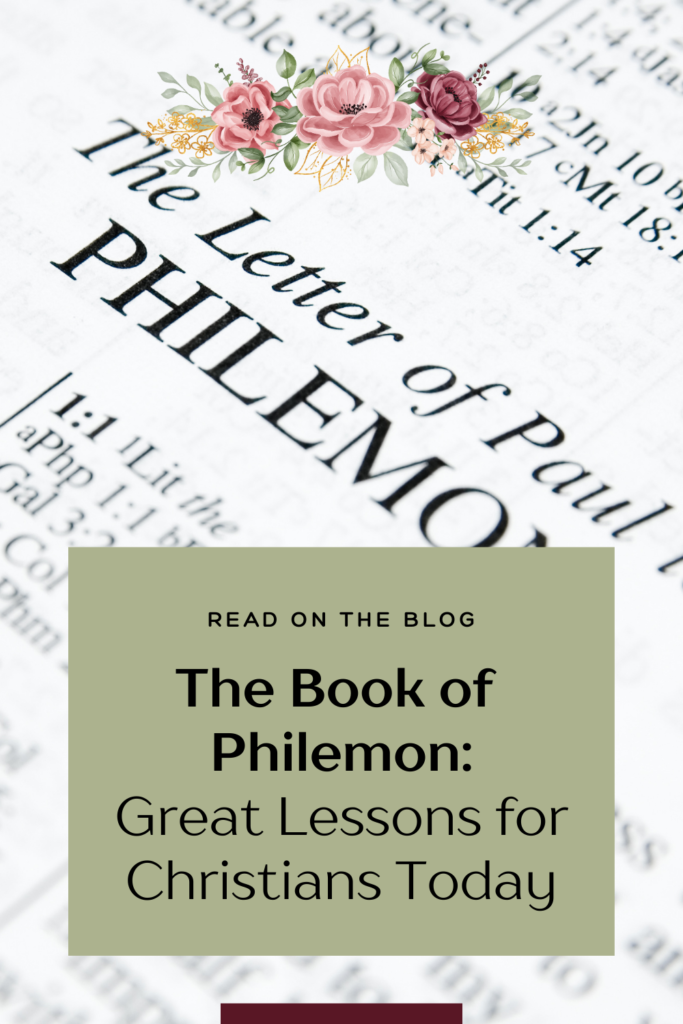The Book of Philemon is a short letter written by the Apostle Paul to a Christian leader named Philemon, asking him to forgive and welcome back his runaway slave, Onesimus. Despite its brevity, this book offers powerful lessons on forgiveness, reconciliation, and the transformative power of the gospel in our relationships. Philemon speaks directly to how the gospel should shape our interactions with others, especially when it comes to the difficult matters of offense and conflict.
Background of the Book of Philemon
Paul wrote this personal letter to Philemon while imprisoned, likely in Rome. Onesimus, a slave who had run away from Philemon, had encountered Paul during his travels and had been converted to Christianity. Paul sends Onesimus back to Philemon, requesting that Philemon forgive him and receive him no longer as a slave but as a beloved brother in Christ. The letter beautifully demonstrates Christian love, grace, and the radical call to reconciliation.
Key Themes in the Book of Philemon
1. Forgiveness and Reconciliation
Paul calls Philemon to forgive and restore his relationship with Onesimus. He urges him to treat Onesimus as a brother in Christ rather than as a slave. This act of reconciliation powerfully reminds Christians of the forgiveness they have received from Christ and the importance of extending that same forgiveness to others (Philemon 1:15-16).
2. The Power of the Gospel to Transform Relationships
Paul illustrates how the gospel radically transforms relationships. He encourages Philemon to welcome Onesimus not as a slave but as a beloved brother in the Lord. The gospel transcends social and cultural barriers, calling believers to see others through the lens of Christ’s love (Philemon 1:10-12).
3. Christian Love and Sacrifice
Paul offers to repay any debts Onesimus owes to Philemon, demonstrating the sacrificial nature of love. His willingness to take on this debt mirrors Christ’s sacrifice, as Jesus paid the ultimate price for humanity’s sins. Paul’s actions show that love sometimes requires personal sacrifice for the sake of reconciliation and peace (Philemon 1:18-19).
4. The Call to Be Christlike in Our Relationships
Philemon provides a model for living out Christ’s love and grace in everyday relationships. The gospel is not just a private matter between individuals and God. It transforms how believers relate to one another, especially in situations of conflict. Paul urges Philemon to forgive and embrace Onesimus because Christ has forgiven both of them.
5. The Radical Nature of the Christian Faith
Paul’s call to treat Onesimus as an equal in Christ was revolutionary in a society with rigid social hierarchies. The Book of Philemon demonstrates how the gospel breaks down societal divisions. It calls for a new way of thinking about relationships—one rooted in equality, love, and unity in Christ.
Key Lessons from the Book of Philemon for Christians Today
- The Call to Forgive: Paul’s request to Philemon to forgive Onesimus is a powerful lesson on the importance of forgiveness in the Christian life. How can you practice forgiveness in your own relationships, especially when you’ve been wronged?
- The Power of the Gospel to Transform Relationships: The gospel has the power to radically transform even the most difficult relationships. How can you allow the gospel to shape the way you view and treat others, especially those you may have conflicts with?
- Living Out Christlike Love: Just as Paul was willing to sacrifice for the sake of reconciliation, we too are called to live out sacrificial love in our relationships. How can you demonstrate love and grace in your interactions with others, even when it’s difficult?
- Breaking Down Barriers: The Book of Philemon challenges us to break down the social, cultural, and personal barriers that divide us. How can you actively work to bridge gaps and build unity within your community, treating others with the same love and respect that Christ has shown you?
- Reconciliation is Possible: The message of Philemon is one of hope: reconciliation is possible, even when there has been hurt. How can you work towards reconciliation in your own relationships, trusting in God’s power to heal and restore?
How We Can Apply the Message of Philemon to Our Lives Today
- Forgive Others as Christ Has Forgiven You: We are called to forgive not just because it’s the right thing to do, but because we have been forgiven by God. Who do you need to forgive in your life today, and how can you extend grace in a way that reflects the forgiveness you’ve received?
- Embrace Reconciliation in Your Relationships: Rather than holding grudges or letting conflicts fester, seek out opportunities for reconciliation. How can you take the first step toward restoring a broken relationship, trusting that God can bring healing?
- Live Out the Love of Christ in Practical Ways: True love is sacrificial and seeks the well-being of others. How can you serve others selflessly, even when it requires personal sacrifice or stepping outside of your comfort zone?
- Break Down Barriers with the Gospel: The gospel has the power to unite people across divides. How can you foster unity in your relationships, church, and community, remembering that in Christ, there is no longer Jew or Greek, slave or free, but all are one in Him (Galatians 3:28)?
- Be an Agent of Peace and Reconciliation: Just as Paul advocated for reconciliation between Philemon and Onesimus, we are called to be peacemakers. How can you be an agent of reconciliation in your family, workplace, and church community?
Conclusion
The Book of Philemon is a beautiful picture of how the gospel transforms relationships. We are called to live out Christ’s love through forgiveness, love, and reconciliation in every aspect of life. Paul’s letter to Philemon reminds us the gospel breaks barriers, heals wounds, and restores what’s broken. Philemon challenges us to live as Christ did—offering forgiveness, embracing reconciliation, and sacrificially loving others.
Call to Action
How can you apply the lessons from Philemon to your life today? Who do you need to forgive, and what steps can you take toward reconciliation? Share your thoughts in the comments below. Let’s encourage one another to live out the radical love of Christ in our relationships.






